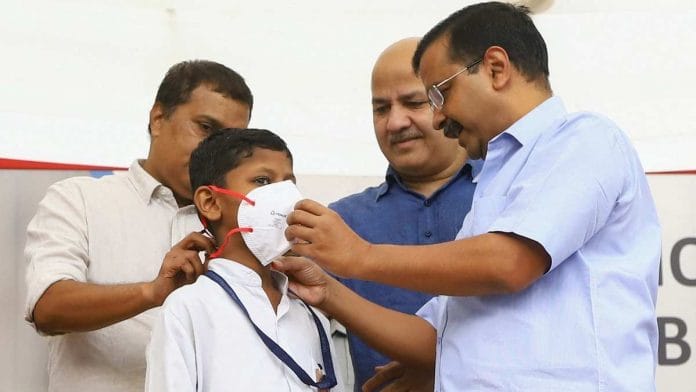New Delhi: Chief Minister Arvind Kejriwal on Friday told school children in the city that smoke emanating from stubble burning in Punjab and Haryana was causing air pollution here and asked them to write letters to chief ministers of the two states urging them to control it.
Kejriwal distributed masks to school children as part of the government’s initiative to protect them from pollution and also explained children about stubble burning.
The Delhi government has procured 50 lakh N95 masks for distribution among children in private and government schools.
He said the smoke emanating from stubble burning in Punjab and Haryana causes pollution in Delhi.
“Please write letters to Captain uncle and Khattar uncle and say, ‘Please think about our health’,” he told children.
He also urged Haryana CM Manohar Lal Khattar and Punjab CM Capt Amarinder Singh to think about the health of children and take steps to stop stubble burning.
The chief minister also urged students to help in stopping garbage burning in the national capital.
“We have to stop garbage burning in Delhi. If you see anyone doing so, request them to not do it. If they do not listen, there is a WhatsApp number to report it,” he said.
Later, in a tweet, he hit out at the state governments of Punjab and Haryana over stubble burning.
“The government of Khattar and Captain is forcing its farmers to indulge in stubble burning that is contribution towards pollution in Delhi. Yesterday, people expressed their anguish against the state governments by protesting outside Punjab and Haryana Bhawans,” he said in a tweet in Hindi.
On Thursday, a protest was led by senior AAP leader Gopal Rai, who sat with party members outside Punjab and Haryana Bhawan, to protest against alleged inaction by the state governments in controlling stubble burning in their states.
The blanket of haze over Delhi thickened on Friday morning with the national capital’s pollution levels increasing overnight by around 50 points, taking the overall air quality index to 459.
Also read: Delhi’s air quality dips to ’emergency’ category second time this year






